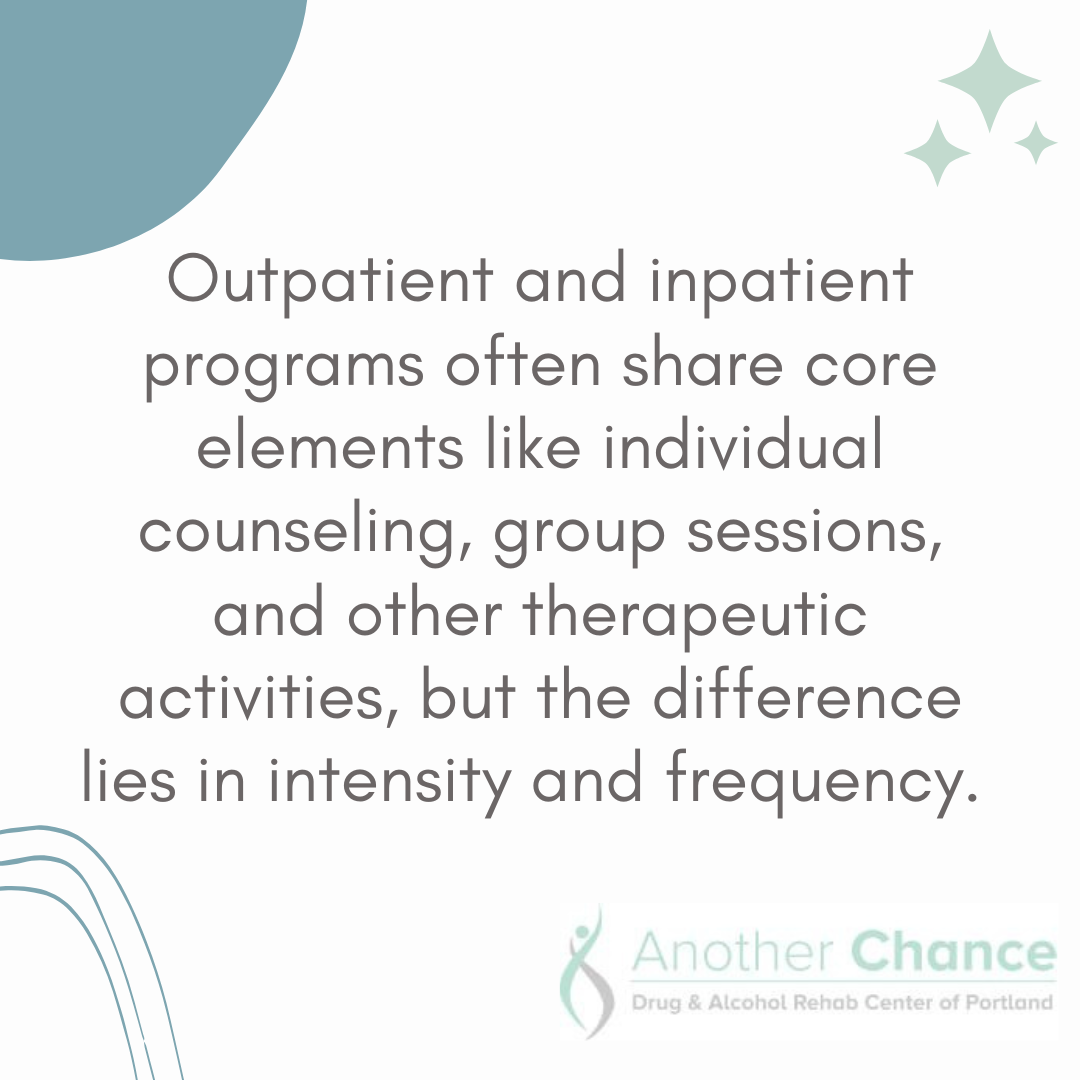September 12, 2025
Learn how outpatient addiction treatment programs in Portland compare to inpatient rehab. Know how they foster recovery while staying connected to life.
Recovery asks a lot of you: patience, persistence, and a willingness to rebuild. One of the hardest parts is finding a balance between staying connected to everyday life and committing fully to treatment. That’s where outpatient addiction treatment programs in Portland come in.
In contrast to inpatient programs, outpatient care is a different way to approach recovery without stepping away from your world entirely.

Treatment programs share a common goal, and that is helping you heal. However, the way they’re structured can look very different.
Inpatient treatment places you in a highly structured environment with round-the-clock support, which can be especially helpful if you’re in the early stages of recovery or facing severe addiction.
Outpatient programs, on the other hand, give you flexibility. These programs let you apply recovery skills in real time, at home, and in the community
Outpatient and inpatient programs often share core elements like individual counseling, group sessions, and other therapeutic activities, but the difference lies in intensity and frequency.
For example, a High Intensity Outpatient Program (HIOP) provides 4 to 6 hours of sessions a day, five days a week. This is similar in structure to inpatient care, but without requiring you to live on-site. As you gain stability, you may transition to an Intensive Outpatient Program (IOP) with 3-hour sessions several days a week, and later to a more flexible Outpatient Program (OP) with just 1 to 3 hours a week.
Inpatient care usually runs on a set timeframe, often 30 to 90 days, with a strong emphasis on completing the full stay. Outpatient programs in Portland are more adaptable.
A HIOP may last a week to a month, an IOP can extend up to 45 days, and an OP typically runs about 30 days. This step-down approach lets you adjust the level of care as your recovery strengthens, without losing continuity.

Outpatient care offers a way to heal without stepping away from your life completely, making it a practical option for many people navigating recovery.
Outpatient options, including partial hospitalization programs, allow you to stay connected to work, family, and community while still receiving consistent support. Here’s how they support flexibility and daily life.
Many outpatient addiction treatment programs in Portland use proven approaches to help you build long-term recovery skills:
When you’re weighing recovery options, effectiveness matters. Research shows that each type of program has its strengths, and an outpatient program can be just as impactful as inpatient care when it aligns with your needs and lifestyle.
Studies often find that inpatient programs have higher completion rates, largely because of the highly structured, 24/7 environment. One study found that relapse rates were about 45.33% for inpatient participants, compared to 56% for outpatient participants.
At first glance, this suggests inpatient care provides more immediate stability. But over time, research shows that outcomes between the two settings can become very similar, especially when outpatient treatment includes strong therapeutic support and consistent follow-up.
The success of treatment depends less on whether it’s inpatient or outpatient and more on whether the program fits your personal circumstances.
Outpatient care is highly effective for individuals who have stable housing, supportive relationships, and a readiness to stay engaged in their recovery. In these cases, the flexibility of outpatient treatment becomes an advantage, allowing you to maintain your routines while still receiving meaningful support.
Inpatient programs may be a better fit for those facing severe addiction, unsafe living environments, or the need for a complete break from external triggers. Still, even in these situations, outpatient programs often play a key role as a step-down level of care, helping people transition smoothly back into their daily lives.

When cost is part of the decision, outpatient addiction treatment programs in Portland often stand out as a more accessible option. Because you’re not paying for housing, meals, or 24-hour staffing, outpatient care typically comes at a fraction of the cost of inpatient rehab while still delivering comprehensive support.
Outpatient rehab in Portland generally averages around $2,250 for a 30-day program, which breaks down to about $75 per day. In contrast, residential or inpatient programs can cost significantly more: an average of $58,894 for a 13-week stay, or roughly $652 per day. This cost difference reflects the added expenses of room, board, and continuous staffing that come with inpatient treatment.
By comparison, outpatient programs allow you to access professional support and evidence-based therapies without those overhead costs.
Yes, both outpatient and inpatient care can often be offset by insurance or financial aid. Many private insurance plans cover addiction treatment, with outpatient programs usually requiring lower co-pays than inpatient stays. Medicare is also an option for eligible individuals and provides coverage for both settings.
Beyond insurance, some Portland-area treatment centers offer sliding-scale fees, scholarships, or payment plans to help reduce the financial burden.

Who Is Best Suited for Outpatient vs Inpatient Addiction Treatment in Portland?
Choosing between treatment settings is personal. Outpatient addiction treatment programs in Portland are designed for people who want professional support while staying connected to their daily routines and responsibilities.
As stated, inpatient rehab is often recommended if addiction is severe, relapse has happened repeatedly, or home isn’t a safe place to heal. The structure and 24/7 support create a protective environment where recovery can take root. Outpatient care, on the other hand, is a strong option for those who already have stability in their lives and want to apply what they’re learning in real time, with consistent professional guidance along the way.
Recovery is never one-size-fits-all. What matters most is finding a program that matches your life and your goals. If you’re exploring options, Another Chance offers outpatient addiction treatment programs in Portland that provide both flexibility and real support, helping you move forward without stepping away from everything you’re working hard to hold onto. Reach out today!

Reviewer
Henna is a content strategist with over 5 years of experience in behavioral health marketing. She specializes in creating informed, compassionate content for addiction treatment centers, using her deep understanding of the industry to educate, engage, and support individuals seeking recovery.